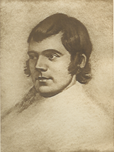The Poet's Welcome To His Illegitimate Child
by Robert Burns
Thou's welcome, wean! mischanter fa' me,
If ought of thee, or yet thy mammy,
Shall ever danton me, or awe me,
My sweet wee lady,
Or if I blush when thou shalt ca' me
Tyta or daddy.
Wee image of my bonnie Betty,
I, fatherly, will kiss and daut thee,
And dear an' near my heart I set thee
Wi' as guid will,
As a' the priests had seen me get thee
That's out o' h-ll.
What tho' they ca' me fornicator,
An' tease my name in kintra clatter:
The mair they talk I 'm kenn'd the better,
E'en let them clash!
An auld wife's tongue's a feckless matter
To gi'e ane fash.
Sweet fruit o' mony a merry dint,
My funny toil is now a' tint,
Sin' thou cam' to the warl' asklent,
Which fools may scoff at;
In my last plack thy part 's be in't -
The better half o't.
And if thou be what I wad hae thee,
And tak' the counsel I shall gi'e thee,
A lovin' father I'll be to thee,
If thou be spar'd:
Thro' a' thy childish years I'll e'e thee,
An' think 't weel war'd.
Gude grant that thou may aye inherit
Thy mither's person, grace, and merit,
An' thy poor, worthless daddy's spirit,
Without his failin's,
'Twill please me mair to hear and see 't
Than stockit mailens.
Notes to the poem:
We cannot take this effusion as giving a true index of the poet's feelings in the circumstances in question. Lockhart says: "To wave the quantum of the sin, he who two years later wrote The Cotter's Saturday Night had not, we may be sure, hardened his heart to the thought of bringing additional sorrow and unexpected shame to the fireside of a widowed mother. But his false pride recoiled from letting his jovial associates guess how little he was able to drown the whispers of the 'still small voice'; and the fermenting bitterness of a mind ill at ease within itself escaped (as may be too often traced in the history of satirists) in the shape of angry sarcasms against others, who, whatever their private errors might be, had at least done him no wrong. It is impossible not to smile at one item of consolation which Burns proposes to himself on this occasion:
The mair they talk I 'm kenn'd the better,
E'en let them clash!
This is indeed a singular manifestation of 'the last infirmity of noble minds.' "
Source:
The Poetical Works Of Robert BurnsCopyright 1910
Ward, Lock, and Co., Ltd
